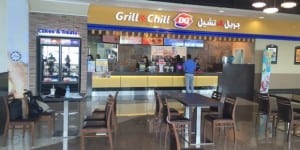Over 20 outlets are planned across the UAE over the next four years
Dairy Queen, an American fast food chain backed by billionaire Warren Buffet, has revealed plans to expand across the United Arab Emirates over the next four years.
The brand currently has one outlet in Ras al Khaimah, and plans to open two more in Yas Mall and World Trade Centre Abu Dhabi within the next few weeks.
World Trade Centre Abu Dhabi within the next few weeks.
Negotiations are also ongoing over a location in Dubai which is hoped to open by the end of the year,” a statement said.
In total, over 20 outlets are planned across the UAE by the end of 2019.
Dairy Queen was present in the UAE for several years in the past, but the last outlet was closed in 2010 after the franchisee decided not to continue the business.
In November last year, US-based franchise company Bajco Group said it signed a deal with Buffett’s Berkshire Hathaway to bring the fast food brand back to the UAE.
Director of Operations of the Dairy Queen franchise in the UAE Malik Bajwa said: “Dairy Queen was here a long time ago and now we are seeing the re-entry.
“This is a great brand with a great product. It is huge in the US and the GCC and is expanding across our region, in Saudi Arabia and Kuwait.”
Dairy Queen will offer burgers and ice creams, targeting the middle-income segment of the market. The brand’s most popular product is Blizzard, a thick and creamy ice-cream.
“We use 100 per cent beef or chicken in our products. We believe our product is of the best quality,” added Bajwa.
Founded in the US in 1940, there are now more than 6,000 Dairy Queen outlets worldwide.
The UAE’s food and beverage sector is booming, attracting several international brands into the market.
A growing and relatively young population, high levels of affluence and increasing tourism are all boosting the industry.
According to a report from KPMG, the UAE’s F&B sector grew 5 per cent from 10.8bn in 2013 to $11.3bn in 2014. The market is estimated to reach $11.7bn in 2015 and $13.2bn by 2018.
Meanwhile the number of F&B outlets will increase by around 1,600 by 2019, KPMG noted.



